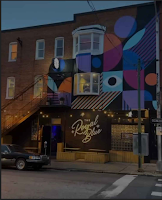Whitelock Community Farm
My name is Allie Linn and I am a junior Interdisciplinary Sculpture major at MICA with an Art History minor and a Sustainability and Social Practices concentration. During the summer of 2012, I interned at Whitelock Community Farm, a local urban farm in Reservoir Hill, to further my knowledge of urban agriculture. I began working at Whitelock Community Farm this past semester through Hugh Pocock’s Baltimore Urban Farming class, and I found myself instantly drawn to doing manual labor while also engaging in the community in the pursuit to provide the neighborhood with access to locally grown and affordable produce. In some ways, I see it as completely separate from my artistic pursuits, but in other ways, I believe the two go hand in hand. The farm and its mission make up an entire, long-term design project that represents the type of work I want to be making, and I saw continuing to work at Whitelock as an opportunity to further my knowledge of community arts and urban agriculture.
I talked to the farm’s manager, Elisa, about the possibility of interning at the farm over the summer, and she was very enthusiastic about the idea. Although it is only about two years old and a quarter of an acre in scale, Whitelock Community Farm functions just as a large-scale farm would. There was a goal of harvesting six thousand pounds of fruits and vegetables this growing season, and it has nearly been met. Bamboo trellises of string beans and cucumbers, beds of kale and beets, and green houses filled with microgreens and herbs fill the premises, maximizing the small amount of space. Every Saturday, there is a market stand where neighbors can stop by, even using food stamps, EBT and SNAP to buy produce, and the local corner store, which once only sold soda and snacks, now carries eggplant, tomatoes, zucchini and onions from the farm. Produce is sold at the Waverly farmers market through the Baltimore Farm Alliance, and the farm’s approximately fifteen CSA (Community Supported Agriculture) members receive a heaping back of groceries weekly. Whitelock’s number one concern is providing Reservoir Hill’s residents with real, healthy food, and it is this commitment to community that I was drawn to.
At the farm, I worked alongside Elisa Lane, the farm manager, to assist in carrying out all of the necessary duties, including weeding, watering, seeding new plants, transplanting early plants from the greenhouse to the hoop house or the hoop house to outside, caring for diseased plants, laying down new irrigation, harvesting produce, washing and bunching produce for markets, managing the Saturday market stand, weighing and documenting the harvested produce, representing the farm at various events, and painting the new shed. I was able to learn all of the basics of farming in the city in the process, as well as how to turn farming into a profitable business.
More than anything, this internship was an amazing opportunity for becoming much more engaged in Baltimore’s agriculture community. Urban farming has become increasingly popular in recent years all around the country as people have begun questioning the use of pesticides and genetically modified crops, and it is especially promising in Baltimore City, where so many so-called “food deserts” limit access to healthy food and instead promote obesity, diabetes, and heart disease. The movement towards fresh, local food in Baltimore is surprisingly large, though not always advertised, and working at Whitelock this summer exposed me to a number of groups and organizations dedicated to this local food revolution. In some ways, agriculture is a dying industry in the United States, but in other regards, it is one that is just beginning to experience a renaissance. It may not be the most lucrative or respected career choice in the country, but I find it to be a very humbling one as well a necessary one. I know I will always continue to create art, but I certainly hope that the desire to grow my own food will always remain as well. Interning at Whitelock Community Farm this summer helped me to acquire a number of skills related to urban farming, but it also helped me to realize the necessity of gardening and farming in my own life.
I would strongly recommend working at a local farm, such as Whitelock, to MICA students interested in urban agriculture. There is a lot to be learned with so many limitations of an urban environment, and it really raises awareness and appreciation for where and how our food is grown.





